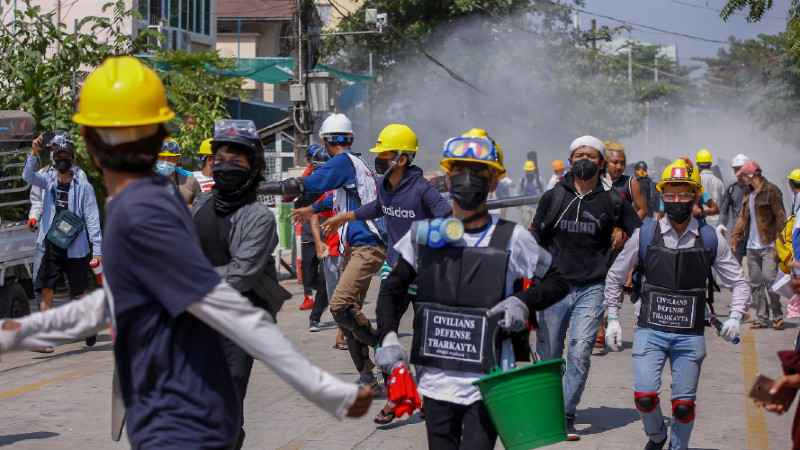Myanmar police raid housing for striking railway workers

Buddhist monks, supporters of anti-coup protesters display placards during a march through the streets of Mandalay, Myanmar, Wednesday, March 10, 2021. CRPH stands for Committee Representing elected members of the Union Parliament from the National League for Democracy Party."[AP Photo]
Myanmar security forces on Wednesday raided a neighborhood in the country’s largest city that houses state railway workers who have gone on strike to protest last month’s military coup.
Police sealed off the Mingalar Taung Nyunt neighborhood in Yangon where the Ma Hlwa Kone train station and housing for railway workers are located. Photos and video on social media showed officers blocking streets and what was said to be people escaping.
At least three arrests were reported, but couldn’t immediately be confirmed. There was no apparent resistance to the raid, and local media reported that the authorities forced at least some residents from their homes.
Later Wednesday, police fired warning shots, tear gas, stun grenades and live rounds in other areas of Yangon to disperse protesters. In North Okkalapa, press and social media reports said at least 200 people were arrested. About 400 young people who were detained in mass arrests a week ago are believed to still be behind bars.
The raid on rail workers comes just days after several Myanmar unions, including the Myanmar Railway Worker’s Union Federation, issued a joint call for a nationwide work stoppage. They said the strike would be part of a broader effort for “the full, extended shutdown of the Myanmar economy.”
Myanmar protesters venture out despite police violence
Despite the increasingly violent tactics of security forces, protests continued Wednesday in cities and towns across the country, including Yangon, Mandalay, Monywa, Dawei, Myitkyina, Myitkyina, Bago, Kalaw and Myingyan. Some were met with police force, while others were brief and violence-free.
Riot police in Dawei fired tear gas, forcing marchers to disperse and hide. There were also reports of the use of rubber bullets. No injuries have been confirmed.
A leading organizer of protests in the small southern city was arrested Wednesday morning, according to the local Dawei Watch news service.
Dawei has become a hotspot for anti-coup protests and has experienced heavy police crackdowns, with up to five deaths.
In Mandalay, the country’s second-largest city, Buddhist monks joined about 1,000 demonstrators marching through the streets near their monastery. They carried a banner that read “Demonstrating Peacefully.” The march ended before security forces could confront them.
Myanmar has been roiled by protests and other acts of civil disobedience since the Feb. 1 coup that toppled elected leader Aung San Suu Kyi’s government just as it was to start its second term. The coup reversed years of slow progress toward democracy in the Southeast Asian nation after five decades of military rule.
Security forces have responded with mass arrests and at times lethal force. At least 60 protesters have been killed since the military takeover, according to the independent Assistance Association for Political Prisoners.
Authorities have also moved to shut down independent reporting, both through arrests of journalists and the closure of media outlets.
State railway workers in Yangon and across the country were among the earliest organized supporters of the protest movement and their strike began soon after the coup.
Police last month attempted to intimidate railway workers in Mandalay by roaming through their housing area one night, shouting and randomly firing guns.
The junta now in control of the country, formally called the State Administration Council, indirectly acknowledged the effectiveness of the rail strike.
The state-run Global New Light of Myanmar newspaper on Tuesday cited officials as saying that rail transport between Yangon and Mandalay would resume “in the near future.”
It also acknowledged that the banking sector has been affected.
The dawn raid on the railway workers on Wednesday followed another night of intimidation by police marching through residential areas in several cities after the 8 p.m. curfew, firing guns and stun grenades and staging selective raids to arrest people.
The Democratic Voice of Burma news service and other media reported Wednesday that the anti-military People’s Party said a protester detained at Insein Prison in northern Yangon had died and his body was left unclaimed. The prison has been notorious for decades for holding political prisoners, and many of the hundreds of people arrested in Yangon in recent weeks are inside.
On Tuesday, a school principal and supporter of the protest movement died of unknown causes after being taken into custody by security forces, according to media reports and an activist who knew him.
Days earlier, a local activist with Suu Kyi’s National League for Democracy party also died in custody. Witnesses said his body had wounds consistent with torture, according to New York-based Human Rights Watch.
Democratic Voice of Burma also reported that three NLD officials in Mandalay were detained Tuesday night.
According to the Assistance Association for Political Prisoners, more than 1,930 people have been arrested in connection with the coup. Dozens of journalists have been arrested, including Thein Zaw of The Associated Press, who has been charged under a public order law that carries a penalty of up to three years in prison.